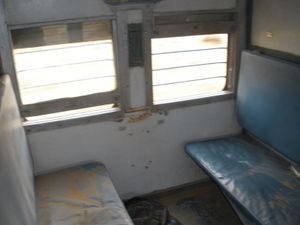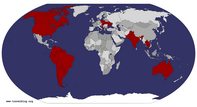Advertisement
Published: July 24th 2008

 Sleeper Class
Sleeper Class
Not luxurious, but when the dust storms hit...That there would no air-conditioned coaches on the desert rail line between Bikaner and Jaisalmer made little difference to me. So what? Why should it matter? It is a morning journey. I’ll be in a hotel room by mid-afternoon anyway. Except for the padding on the seats, there is little difference between traveling this train in second class or the inferior sleeper class. The masses jump on the hard wooden benches of the sleeper cars, as the empty train halts at Bikaner station twenty minutes before the seven-thirty a.m. departure. Moms supply padding to soften the blow between bench and bottom. Within a short time, sleeper class is bulging with passengers. Many of them have fallen asleep, uninterested in the morning routines at Bikaner’s railway station. Families and day workers climb down from one platform and cross the tracks to board on the rail side of the train. Adults hand over duffle bags, children, and food to other passengers through windows and doors. All willingly assist each other with the spontaneous boarding process. I had walked down the end of the first platform and used the crosswalk two hundred yards away and got to the train the proper way. I was

 Where Did That Come From?
Where Did That Come From?
In the air, the powerder is hard to see...the only one. The other hundred or so knew the procedure better than me.
A station worker walks me to my coach; there is no indication on my ticket as to which of the cars is mine, only a seat number. The man with the long steel rod is confident and gives a good push from behind to get me and my pack through the entrance. Easily the only Westerner at the station, I am immediately alone inside the carriage. Dust has caked the protective grate of the overhead, antiquated fans of the carriage. But the blades still spin, whir, and move the stale air about. I sit at berth thirty-three, awkwardly content. It would be an hour until I saw another human being pass in the corridor or sit at the compartment in front of or behind me. I have water and the breakfast Mrs. Chhalani prepared for me the night before as a care package: slices of papaya, mango, and cheese sandwiches. Great, I have everything I need for the next six plus hours! I can face the window and watch the Thar and Rajasthan go by from the comfort of my own compart-, no. From my own carriage.
By the time we reach the station at Nokhra, I hear a baby crying at the far end of the carriage. A few folks must have gotten on; I have not been paying attention, rather watching the goats, scrub, and mysterious signposts facing away from the train as we blow by. The signposts are for motor traffic, but there is no paved road. In fact with effort, it is possible to detect tire tracks in the vicinity of each sign, most likely to warn of the railway crossing. The faint remains of two thin depressions run from the rails past the left of the solitary sign staked into the sand. One hundred yards farther, the Thar has consumed them. The baby continues to not just cry, but wail. Its screams constrict the muscles in the back of my neck. I consider moving elsewhere, but will stick it out. I have earplugs somewhere in my pack, but I am too lazy to dig for them right now.
At Bap, a boy in a blue and red print t-shirt calls out for passengers to come for tea. “Chai! Chai!” he yells. Three or four gather around him and he distributes small servings from a large green thermos. This is the seven-year-old’s job. I wonder for how long he will keep it before moving on to something else. Or will he? I do not get off the train but realize that stops in station between Bikaner and Jaisalmer are prolonged. Station attendants dash the length of the eleven cars and finally hand a piece of paper to the conductor in the locomotive. His whistle blows and we shift forward. Vendors make a quick move to the exits and jump off while we are in motion.
By Malar, I receive a miniscule hint of what is to come. It is hard to see at first because someone unfamiliar with desert travel would never be looking for it. I start to mildly choke and cough up the increasingly warm air. First a gag, and then another. Then empty, dry coughs shoot out originating from my larynx. I react as if something is stuck in my throat, but nothing is there. I cannot figure out why or how this is happening. In a short while the gags are gone and I pretend nothing of importance has taken place. Nevertheless in the back of my mind, there is a part of me that is always on guard when it comes to health risks and injuries. I will remember this episode, and hopefully it will be gone for good.
I run my forefinger over the worn blue vinyl bench and clear a thin film of light brown powder. Not only does a layer cover the bench, it has enveloped all the other berths, upper and lower. As I stand, I turn around to see where I was seated. The shiny blue vinyl part is in a semicircle outline, the inside clear, the outside ever so shaded with the film. Grit has found its way into the tiny crevasses of my back molars. I bite down and hear the crunch of the particles against my enamel. Funny, I think to myself: I haven’t opened my mouth at all, not even for a drink. How is this possible? Powder has settled on my daypack. I put my arm up to the window and discover the microscopic grains of grit in the pores of my skin. I bite down a second time and a third and there are more particles in my mouth. I am tired but am kept awake by this mystery.
The Thar takes little time to unveil its secret. Without warning, waves of powder from the desert floor kicked up by the surge of the locomotive and accompanying cars pour into the compartment and billow through the rest of the carriage. Luckily I have sunglasses on; my eyes are protected but I squint anyway. Women who have stretched out pull a handkerchief (they came prepared, unlike me) and tie it around their heads to cover their faces. Then they dive into a corner of the bench and face where the bench meets the carriage wall in the corner. None ever speak and only surface when the mini tempest is over.
This happens three more times on the way to Jaisalmer. One of them is a veritable dust storm that sideswipes the train from the west. The blanket of dust reduces my vision in the carriage to a cloudy haze. No one closes the windows, for that would be worse. The temperature would rise to an intolerable point, one even more unpleasant than the dust storm. Every part of me is coated in the Thar’s residue.
The Thar is a desert of extremes. As the last disturbance of dust subsides, I enjoy normalcy again even if for a short time. Even at Phalodi Junction, the midpoint of the journey, the southwestern horizon shows ominous signs of the next event. The sky is dark, only lit up by flashes as if from a Polaroid. We are in sunlight, but it seems not for very long. The first drops are almost undetectable because most of them have evaporated before they reach the rails. The next stage is delightful: full heavy drops hit the train, my exposed arm out the window, and the protective bars that prevent passengers from jumping in for a free ride. The temperature drops into the eighties, another prize. Then the inevitable deluge commences. Rain pelts the train. The windswept water enters the carriage and painfully smacks passengers’ belongings and cheekbones. The storm has intensified to where all the passengers in the carriage silently work in concert to shut the windows; all of the benches are drenched. We amass in the corridor standing, the only place where water has not found dry floor. Some of us jump up on a higher berth. The train does not slow down, but I immediately look out to see instantaneous whitewater rivers rush through the Thar with no apparent outlet. The blitzkrieg tempest has created tens of silvery sheen lakes a half mile long, a few hundred yards wide, and several inches deep within a matter of minutes. What was once arid lifelessness now could be the Everglades. I fear the conditions will worsen and the train will have to stop. If the rails fall into a low lying area, it could be too dangerous. The monsoon season in the Thar is welcomed by Rajasthanis, but it is not a gentle arrival. Without warning, streams of water rush through the floor of our carriage. As a single unit, all of us grab our bags and hoist them on the top berths. Noah had an easier time loading his ark. Soon the floor is wet from one end to the other and we never find out where the water came from. Eventually all twelve of us sit on benches facing the corridor, dripping wet. We see that even though all the windows are closed, water keeps gushing in through cracks.
There is a silence. We have everything under control. The train trudges on and the downpour begins to surrender to breaks in the clouds.
Advertisement
Tot: 0.198s; Tpl: 0.012s; cc: 22; qc: 113; dbt: 0.1375s; 1; m:domysql w:travelblog (10.17.0.13); sld: 1;
; mem: 1.5mb












Krishna
non-member comment
A captivating description. Your blog does make an interesting read.